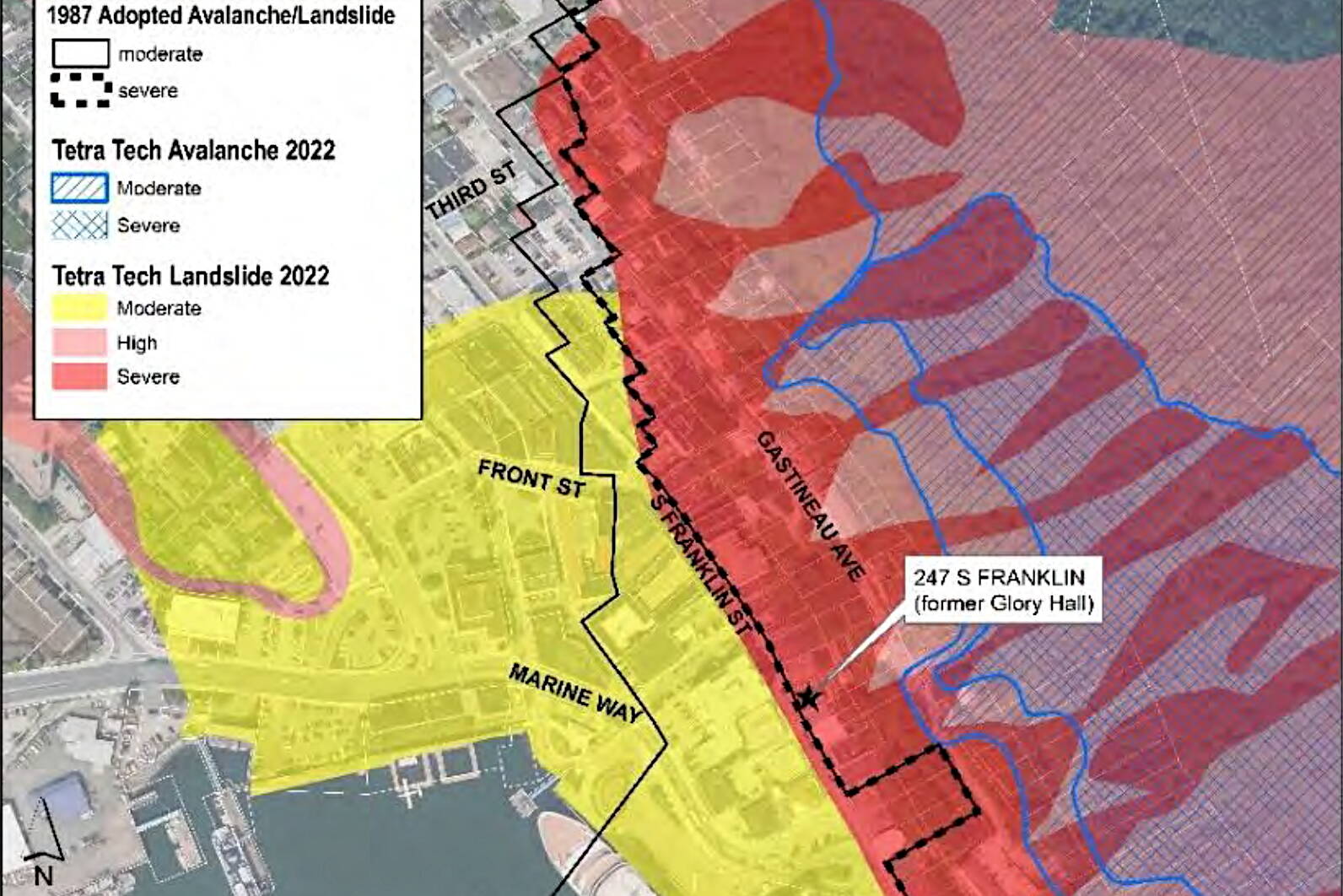The Glory Hall is yet again facing city officials urging a rejection of a year-old proposal to turn the homeless program’s former downtown shelter into low-income housing – but this time new findings are being raised due to last month’s landslide on a hillside almost directly above the building that destroyed or damaged three homes on Gastineau Avenue.
Converting the former shelter at 247 S. Franklin St. to housing is both dangerous and a violation of applicable ordinances because it is in a landslide/avalanche hazard zone, according to a report released Monday by Juneau’s Community Development Department.
The Sept. 26 landslide’s occurrence and resulting damage is referred in a section of the 331-page report assessing historic and current hazard zones in the area, but not specifically referred to in a list of CDD findings summarizing why they recommend rejection of the project.
“The development of a multi-family dwelling in a Mapped Severe Landslide and Avalanche Hazard Area would put residents, including some of the most vulnerable members of the community, in a Mapped Severe Landslide and Avalanche Hazard Zone,” one of the findings states.
It’s an objection the department has stated since the project was first evaluated last October, with the Planning Commission subsequently rejecting the department’s position twice and ordering staff to help the Glory Hall obtain a conditional use permit.
Instead, the matter and many of the same arguments are on the commission’s agenda next Tuesday.
“I still think it’s an absurd and crazy reasoning which I hope the Planning Commission will disagree with,” said Mary Alice McKeen, an attorney representing the Glory Hall pro bono.
The proposal would convert the former shelter, which could house up to 53 people, into seven apartments able to house a total of 14 people. Initially the CDD also questioned the residential density in the building, but that has been resolved.
Both CDD and the Glory Hall have reiterated their stances on whether the building truly is in a hazard zone, presenting extensive historic and statutory documentation dating back more than three decades to support their positions. The Planning Commission, which most recently heard the matter in August, has stated CDD erred in its interpretation of applicable ordinances.
McKeen said if the commission wants to impose conditions for converting the building, including any resulting from concerns raised by last month’s landslide, the Glory Hall is willing to try to meet them. But her objection is CDD’s recommendation for a flat-out denial of the project.
“The question is what can we do with the building?” she said. “We believe that housing people there is the best use of that building.”
Sixteen people offering public comment to CDD between Sept. 22 and Oct. 3 all supported granting the Glory Hall a conditional use permit.
McKeen said she doesn’t believe the latest CDD objection or Tuesday’s meeting will differ much in arguments presented from previous sessions — but in terms of administrative procedure The Glory Hall is facing a setback.
“I don’t think there’s really anything new,” she said. However, “the Planning Commission withdrew its prior findings so they have to begin this anew.”
Another potential complication is there are three members of the commission not involved in previous hearings, including a chairperson who was out of town during the most recent hearing, a member who recused herself previously and a new member, McKeen said. Because of that and due to the volume of the city development department’s objection the commission may delay a decision on the matter until a future meeting.
Among the frustrations with the revolving door of CDD rejections and Planning Commission hearings is the building could have been converted and the new apartments occupied by the beginning of this July if the process had gone smoothly from the start, McKeen said. Now in addition to the bureaucratic barriers the costs and difficulties presented by other factors are piling up.
“I don’t know how soon work can start because of winter or because of contractors or because of supplies,” she said.
• Contact Mark Sabbatini at mark.sabbatini@juneauempire.com

